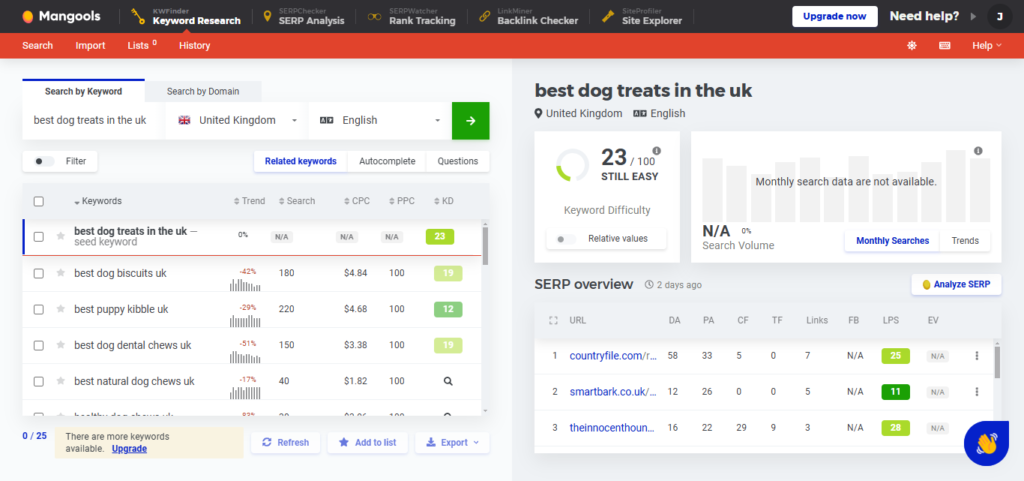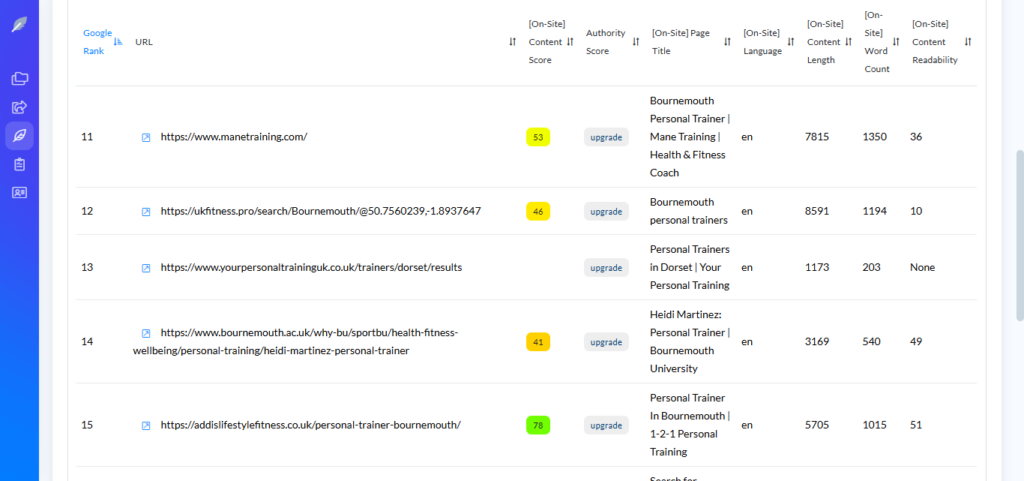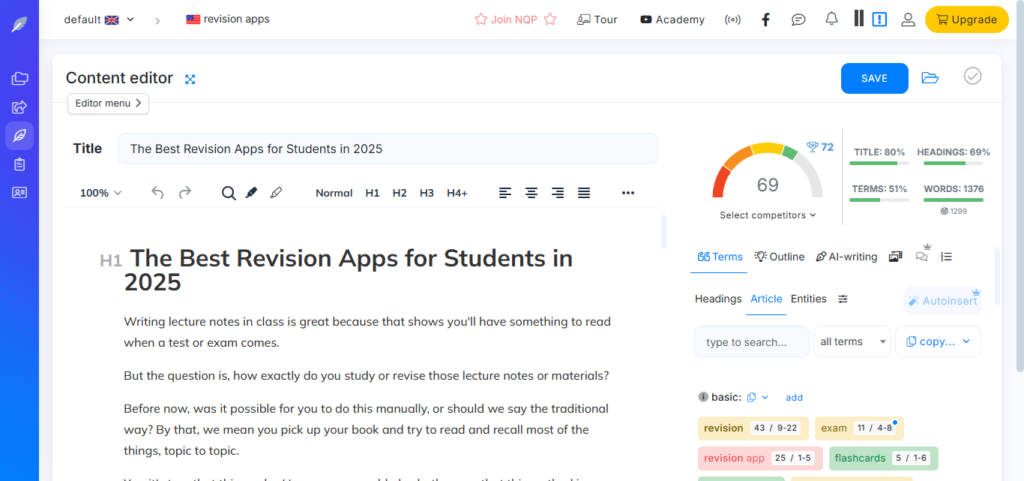10 Best SEO Tools in 2025
The best SEO tools in 2025 are one of the swiss army knives every business owner or solopreneur needs.
As small business owners or entrepreneurs, we all have one simple goal. That’s to grow our business.
But the thing is, this goal isn’t as simple as it seems. Why?
Well, running a business in 2025 comes with a lot of stumbling blocks. One of these setbacks is increasing your brand awareness to reach potential clients.
A good brand or business awareness means more conversations and, of course, more sales.
There is only one cost-effective way you could get this done, and that’s with excellent SEO.
And what paves the way to a solid SEO strategy is when you use excellent SEO tools.
You see the connection, right?
In this guide, I’ll walk you through the best SEO tools in 2025. I’d like to mention that I didn’t come up with a random list of tools here. I’ve used these tools over the years to achieve great client results.
Alright, let’s dive right in.
What Are SEO Tools?
An SEO tool is analysis tool that can improve your business’s ability to rank higher in search engines. I want you to be clear on something when I say your business; it also ultimately means your website.
Of course, you know your website is your business’s digital showroom or store. So, what SEO tools do is to help get your website found when someone makes a search query around your business or industry.
The best SEO tools, including the ones I’m be talking about in the next few minutes, usually help you get four things done:
-
Keyword research
-
SEO auditing and analysis
-
Rank tracking and monitoring
-
Link Building
Keyword Research
Keyword research is looking for search terms that people use when looking for things around your business. By things, it could be information, a product or service. The data you collect during your research can help with your content strategy.
A keyword tool that performs exceptionally well in keyword research is Mangools.
Here is how keyword research works:
Let’s say yours is a pet business in the UK that sells pet foods, treats, and other pet accessories.
You could rank for things pet parents are searching for on Google. These could be dog food or treats for their furry friend.
So, you could write a content like the “best dog treats in the UK” to get across to folks searching for that.

You can see what keyword research looks like on Mangools.
SEO Auditing
SEO auditing is using an SEO tool to identify technical SEO issues on your site.
These issues are broken links, on-page results, speed across devices, meta tag issues, etc.
There are several tools you can use to perform an SEO audit, but I strongly recommend SEOptimer. I like that they don’t ask to subscribe to one of their plans or even sign up with them like most tools do.
You just visit the site and place the URL of the website you want to perform an audit while they do the rest. A good site audit helps you rank on SERP.
Rank Tracking and Monitoring
There are among some of the best SEO tools in 2025 that help check your current keyword ranking and ways you can improve over time.
Let me explain this. If you wrote content, like a blog or even a website copy for your business, let’s say 2023, and now we’re in 2025, it’s possible you’ve been outranked by competitors.
Tools like Ahref, SEmrush and Neuronwriter can help you monitor and track how well your content is performing. This way, you can stay one step ahead of your competitors.
Let me show you an example. So, I wrote the homepage copy for Addislifesytlefitness.co.uk.
The business wanted to rank for the keyword “personal trainer in Bournemouth”. I actually did help them rank very well for that keyword at the time I wrote the copy.
The business was sitting comfortably at the sixth spot. However, due to a lack of rank tracking and monitoring, they were eventually outranked after a year by some competitors.

You can spot them on the 15th spot on the screenshot. You’ll need SEO tools to track how your content is performing.
However, there are other factors, such as most of the top sites having a better domain rating than Addis.
Content Optimization
An SEO content optimization tool is a tool that helps you structure and optimize your content. The aim is simple: to help you rank better in search engines.
There are so many of these tools out there. But I strongly recommend Surfer SEO, Neuronwriter and Frase SEO for this.
A lot of these tools provide what we call semantic keywords. There is a combination of short-tail and long-tail keywords used by competitors you can use to rank your content.
The more basic and secondary keywords you use in the CMS, the better chance you stand to rank.
Here is how this looks on Neuronwriter:

Factors to Consider When Choosing the Best SEO Tools
With so many SEO software tools out there, you can easily get confused about the right one(s) you need to stay ahead.
Here are a few factors you have to look at when choosing the best SEO tool in 2025 for your website.
SEO-centric features
You need to ask yourself what features this tool offers. You see, every search engine optimization tool out there doesn’t actually do the exact same thing.
As I’ve shared earlier, some tools are more tailored for SEO auditing. There are also SEO tools that do best at only keyword research.
For example, these kinds of tools, like Mangools, don’t have a content optimization dashboard like Frase SEO or Neuronwriter.
You need to always factor in the features the tool brings to the table.

The value the SEO tool provides
What kind of value does the SEO tool provide? You have to understand that expensive doesn’t always mean better.
Some of the best SEO tools can range from free to super expensive with advanced capabilities. While that power sounds attractive, carefully assess if you actually require all those functionalities based on business requirements. Often, simple yet effective tools are enough in the initial days.
Evaluate free plans first so you can measure value before upgrading. Market leader SEMRush, for instance, offers robust free options worth checking out. Moz and Ahrefs have free trial versions, too.
User experience, trial options & learning curve
These are three other things you need to pay attention to. A good search engine optimization tool should have a smooth user interface and experience.
Ensure you pick a tool that offers a free trial. You shouldn’t dive into paying for it without testing out the features to see if it’s what your business needs.
The good news is that many of the best SEO tools for small businesses offer a free plan.
The SEO tool should easily integrate with other platforms
If your website runs on WordPress, Shopify or other popular CMS platforms, you need a tool to integrate with it.
For example, Yoast SEO is purpose-built for WordPress sites. Such specialized tools that play nicely with known platforms go a long way to your overall experience.
The Best SEO Tools in 2025 at a Glance
| SEO tools | Standout Features | Pricing |
| SEMRush | Backlink tracking & content audits | $139.95 monthly on their Pro plan |
| Ahrefs | Competitor backlink analysis and research | Pricing starts at $99/month for the Lite plan |
| Google Search Console | Performance insights | It’s a free SEO tool |
| Moz Pro | Domain authority metrics and keyword research | Starter plans start at around $49 per month |
| Ubersuggest | Keyword research | $29/month for its “Individual Plan” |
| Surfer SEO | On-page SEO optimisation | Surfer SEO starts from $99 per month |
| Frase | AI-powered content optimization | Its basic plan is $45 monthly |
| Mangools | Extensive keyword research and tracking | Mangools starts at $49 monthly |
| Clearscope | Content optimisation | Pricing starts at $189 monthly |
| SE Ranking | Extensive website audits | Paid plans start from $65 monthly. |
The 10 Best SEO Tools for Businesses in 2025
Alright, we’re finally come to the crux of the article. Let’s take a deep dive into the ten best SEO tools in 2025 right now.
1. SEMrush
SEMrush is one of the best SEO tools out there. It offers a wide range of features to help you with keyword research, backlink analysis, website auditing, rank tracking and more.
As a business, you know how important it is to choose the right keywords to target. SEMrush makes this easy with its thorough keyword research options.
Simply enter a seed keyword, and SEMrush will suggest hundreds of additional keywords, monthly search volumes, competition metrics, and more. This helps you identify profitable, low-competition keywords to focus your efforts on.
Another great feature is the backlink analysis. You can enter any URL and view detailed reports on the site’s backlink profile. You’ll see where the links come from, anchor text ratios, etc. This is great for spotting promising link-building opportunities.
The site audit tool shows optimization issues that may be holding your rankings back. It checks elements like page titles, meta descriptions, headings, image alt text and more.
In terms of pricing, SEMrush is a little on the high end. You’d have to spend $139.95 monthly on their Pro plan. This gives you access to five projects, 500 keywords to track, and 10000 reports.
SEMrush also offers a guru and business plan, which cost $249 and $499.95, respectively, on a monthly basis.
One downside is the interface can feel a bit overwhelming initially. The sheer depth of data may seem daunting until you get familiar with the platform.
2. Ahrefs
Similar to SEMrush, Ahrefs is an SEO toolkit that helps boost search traffic, grow backlinks and monitor ranking progress.
Its incredibly large index of over 15 billion web pages is a key strength. This huge dataset combined with Ahrefs’ crawler and AI systems, accurate and insightful keyword research and backlink analysis.
For instance, the keyword research section gives search volume predictions for over 2 billion keywords. This also includes historical organic click data, cost-per-click estimates, suggested related keywords and more.
You can easily see which terms are generating lots of searches while remaining relatively untapped in your niche.
The backlink checker also leverages Ahrefs’ huge index to show you all the domains currently linking to a URL. You can segment these by type (editorial, forums, web 2.0 properties, etc.), analyze the anchor text ratios used, and export promising targets for outreach.
In terms of suitability, Ahrefs is more suitable for experienced SEO experts and link builders than beginners. The platform offers a ton of customization options that add to the learning curve. They offer a 7-day $7 trial to test it out.
Afterwards, pricing starts at $99/month for the Lite plan, which includes 30 keyword searches per day and five site audits. More keywords, backlinks, and features come with higher plans, such as the $359/month Premium tier.
One possible drawback is that rank tracking capabilities are quite limited on lower tiers. You would need a Standard plan ($179/month) or higher to unlock full site-level rank tracking and position history graphs.
Overall, you should just be prepared for a bit of a learning curve.
3. Google Search Console
Google Search Console (GSC) is a free SEO tool offered directly by Google.
As you might expect, it has awesome integration with Google’s systems. One thing I like is that this free SEO tool delivers up-to-date data on your site’s presence in search results.
GSC should be one of your main sources of truth when tracking Google rankings. Connect your site, and you’ll be able to see current ranking positions and clicks received for thousands of keywords and pages. Trend graphs show your position history as well.
With this info, you can pinpoint underperforming pages for certain terms. This should give you solid proof that when you’re testing, it leads to Google ranking improvements.
Other key features include crawl stats showing indexed pages and errors, manual crawling requests and detailed click analytics. There’s also an international targeting section useful for localizing and translating content.
So, who is the Google search console best for? It’s a great tool for beginners and trained SEO experts. And, of course, being a free Google product, you can’t beat the price and direct integration with their systems.
Potential downsides relate mostly to limits in keyword tracking. The position data only updates once per day. So, while directionally useful, GSC may not be suitable as your sole rank tracker, especially if you need up-to-date accuracy for client reporting.
Depending on your budget, you’d have to combine GSC with any paid platforms for more granular, real-time rank data.
4. Moz Pro
Moz Pro is another very good SEO tool. It’s very similar to Ahref and SEMrush, as it helps analyse your website and that of your competitors to improve your rankings.
Some of the standout features you’ll find useful is its site crawler and page optimisation tools. You can also evaluate your backlink profile and find new link-building opportunities.
Who’s Moz Pro best for?
It works well for SEO agencies that manage multiple websites. It is also okay if you’re an in-house SEO specialist with a few sites to optimise
In terms of pricing, the starter plans start at around $49 per month. This gives access to core SEO tools for a single website. If you want to track more sites, you’ll have to opt into a higher-paid plan.
Moz Pro, like Ahref, has a steep learning curve, especially if you’re a beginner. There’s lots of great data, but it can easily overwhelm you when you don’t know what to do with it.
5. Ubersuggest
Ubersuggest is a popular free SEO tool from Neil Patel. It researches and generates topic ideas along with associated keywords you could target.
This tool is good for content brainstorming and keyphrase research during early planning stages.
Simply enter a topic or URL, and Ubersuggest provides a list of related keywords, monthly volumes, cost-per-click data, and difficulty scores.
A content idea generator suggests angles around a given term to help spark ideas.
In terms of depth, the free version of Ubersuggest offers limited functionality. You only see metrics for a couple of suggested keywords. For example, there is no competitor analysis or ability to filter suggestions by search volume ranges.
Neil offers paid versions starting at $29/month for its “Individual Plan” to £99/month for the “Enterprise Plan”. They’ve also got a lifetime plan if you’d like to commit to it long-term.
The free version works nicely for quick directional ideas during content planning.
6. Surfer SEO
Surfer SEO is a tool that makes search engine optimisation look so simple.
They’ve got a lot of decent features like site audits, competitor analysis, rank tracking, and link-building tools.
Surfer SEO is ideal if you’re a small business owner or blogger with very little SEO skills but want to improve your site’s search performance.
Surfer SEO provides clear and actionable recommendations on how to optimise your on-page content, backlinks and site technical elements.
So, what about it’s price?
Surfer SEO starts from $99 per month for the Essential plan. This plan lets you track 200 pages across your sites and optimise 30 monthly articles.
If you’re a marketing team needing more features like tracking 1000 pages across your sites and optimising up to 100 articles, you’ll have to pay more for their Scale plan.
Surfer SEO is a decent tool with customisable site audits, competitor tracking, and intuitive link-building tools.
7. Frase
Frase is very similar to Surfer SEO, which I just spoke about. This SEO tool focuses on content optimisation and research.
The tool can help you write high-performing, search-friendly content that ranks higher. Some standout features I like are the ability to generate content ideas based on questions people are searching for online.
They also have Google Doc integration, allowing you to optimise your writing style as you create content. This is a good SEO tool for small businesses, bloggers and marketers who are interested in search intent data.
Whether you need inspiration on what to write about or want to refine existing content, Frase does a fine job. Its paid plans are more affordable than Surfer SEO, with its basic plan at $45 monthly. The team plan costs 115 per month.
One obvious limitation is that competitor keyword tracking is only included in the Enterprise plan.
8. Mangools
This is one of the best SEO tools in 2025 focusing specifically on keyword research. I’m sure you know that keywords are super important for SEO.
But finding profitable, low-competition search terms isn’t easy without the right tools. That’s the problem Mangools can help you solve.
With a paid plan, you’ll see extensive keyword data directly on the Mangools dashboard. Things covered here include monthly search volumes, cost-per-click metrics, competition levels and more.
You can easily research and export lists of keywords you want to work with. It also provides site audits called “Site Explorer” on the tool. Speaking of pricing, Mangools starts at $49 monthly. Mangools Agency plan costs $89.90 monthly.
The major drawback is the tool mostly centres around keyword research. They didn’t focus much on other areas of technical SEO.
If you need to research profitable, low-competition keywords regularly, Mangools is a great keyword research tool.
9. Clearscope
You’re probably just hearing about this SEO tool for the first time, right? Clearscope is a comprehensive website auditing tool. After performing a site audit, it provides recommendations for improvement.
Regularly auditing your site for on-page issues is very important to how your website ranks. Page speed, accessibility, link quality and more impact how Google views your content. Clearscope makes analyzing these technical and on-page factors easy with an automated full-site crawl and audit.
How does Clearscope work?
All you have to do is enter your site URL or that of a client, and Clearscope will provide a detailed health score. You’re also provided with an optimization plan containing action steps for improvements.
For instance, it may flag issues like broken links, missing alt text, and crawl errors, suggesting fixes to boost page speed or accessibility. The reports also estimate potential search traffic gains if you implement the recommended actions.
Clearscope is more of an enterprise-level SEO platform. Pricing starts at $189 monthly for up to 100 content inventory pages. This puts it out of reach for most solopreneurs and small teams. The focus is more on large brands managing many sites.
One possible downside is the tool only provides recommendations. You would still need technical SEO expertise to implement the suggested fixes.
So, while the audits are comprehensive, it’s good you know it won’t do the optimization work for you. If you manage many large sites and want to prioritize on-page SEO fixes at scale, Clearscope is a solid choice.
10. SE Ranking
SE Ranking is an SEO platform that strongly focuses on rank tracking and website audit capabilities.
A key feature is the rank tracker, which shows the Google ranking position of keywords across your site and lets you track progress over time. You can upload a list of keywords or let SE Ranking crawl your content and auto-suggest terms to track.
The rank data integrates cleanly with other modules like Rank Alerts. With this, you can set up alerts to notify you when a page reaches a certain ranking threshold for a keyword. This helps you spot positive momentum.
A detailed website audit tool also identifies on-page issues, a backlink analysis section to view domains linking to your site, and integration with Google Analytics to pull traffic stats.
Regarding pricing, SE Ranking offers a free version covering one website and up to 25 keyword rankings. Paid plans start from $65/month. More keywords, sites, and features are unlocked in higher tiers.
Overall, SE Ranking is a solid choice for SEOs focused on monitoring site rankings across keywords and pages. The rank tracking and alerts enable you to quickly spot positive momentum during optimization efforts. And the on-page audit provides technical recommendations as well.
How Can JBcontentlab Help With Your Website’s SEO?
With everything I’ve shared, it’s obvious that SEO requires technical skills and heavy time investments. This is something that’s unlikely feasible for you as a business owner.
Why? SEO is not the only thing you have to worry about. You need to pay attention to other aspects of your business.
At JBcontentlab, we can take your content optimization workload off your hands. We’re an in-house team of three experts who can help you with completely human-written, SEO-optimized content for your website.
We’ll handle your site audit, keyword research, SEO content writing and optimization, and proofreading.
You’ll get a quality copy that’s well-written, SEO optimized, fact-checked and proofread. All this while sticking with your brand’s tone of voice and style.
The bottom line? We can help you do the heavy lifting when it comes to your site’s SEO.






